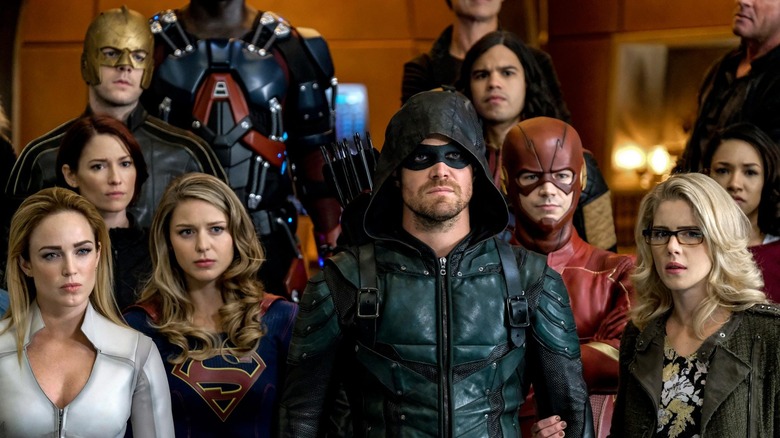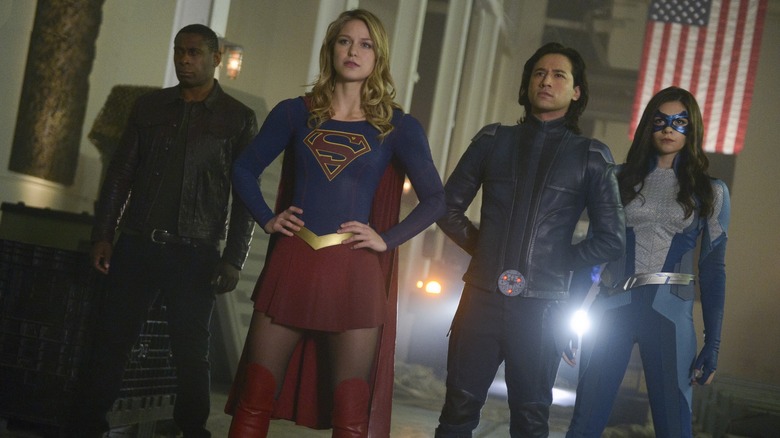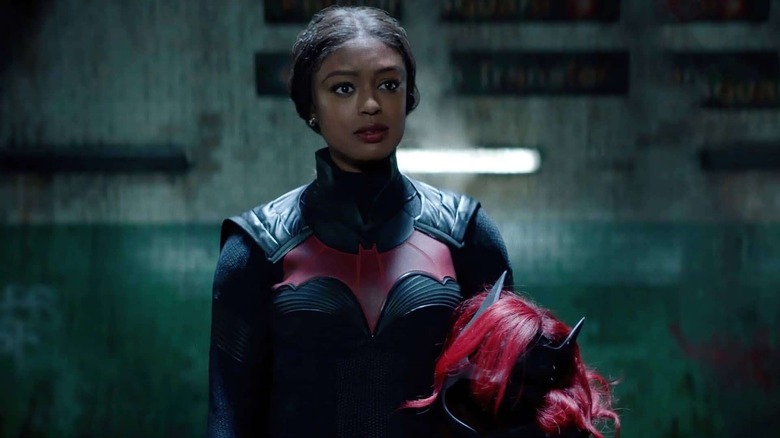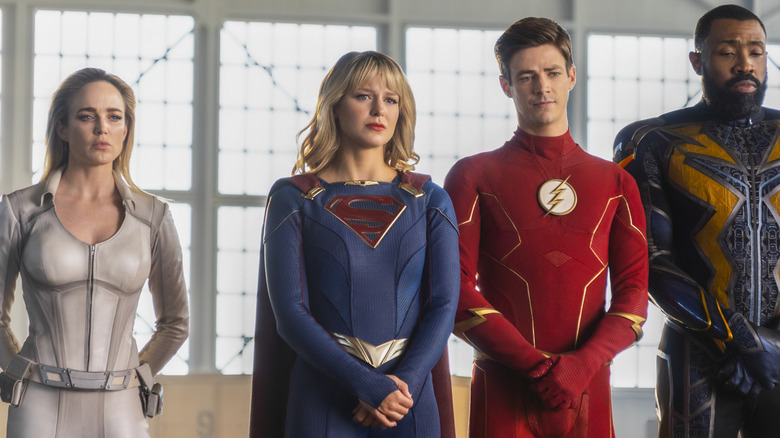The Arrowverse Has Officially Come To An End, And A Vital Part Of TV History With It
While the Marvel Cinematic Universe was busy changing the way Hollywood studios approach their biggest franchises (and all which that implies), The CW and DC were off making TV history with the Arrowverse. Much like the House of Ideas' multimedia superhero property, the Arrowverse was all over the place in terms of its quality and success. Certain killjoys would tell you its flagship series went on for way too long, while others would blame its limited resources and financing for preventing it from truly doing justice to the epic comic book arcs it adapted.
Overall, though, the Arrowverse was a daring experiment in the best way. That's why we're hitting the pause button and reflecting on its legacy before DC Studios head honchos James Gunn and Peter Safran usher in their shiny-new unified vision for all things DC-related.
With "The Flash" having aired its series finale on May 24, 2023, the Arrowverse has officially come to an end. The only two DC series still going on The CW at the time of writing, "Superman & Lois" and "Gotham Knights," exist in separate continuities from both the Arrowverse's live-action shows ("Arrow," "The Flash," "DC's Legends of Tomorrow," "Supergirl," "Black Lightning," and "Batwoman") and their animated web series spinoffs ("Vixen" and "Freedom Fighters: The Ray"). They do, however, technically exist as part of the same multiverse as other DC TV shows that aired on The CW (namely "Stargirl" and "Naomi"), along with NBC's canceled "Constantine" series and the 1990s "Flash" TV show that aired on CBS. Oh, yeah, and basically every other live-action DC film and show ever made, as was established during the Arrowverse's "Crisis on Infinite Earths" crossover event.
Confused? Welcome to the wild, wild ride that is the Arrowverse and the reason we may never see the likes of it again.
An actual creative-driven superhero franchise
Marvel Studios loves to tout itself as being filmmaker-friendly, but it's an open secret that creatives only get so much wiggle room to deviate from the MCU's formulas. Warner Bros. also tried to sell its so-called "Snyderverse" on the merits of being filmmaker-driven and, to their credit, it could be at times, swinging from the grimdarkness of Zack Snyder's DC movies to the gee-whiz vibe of David F. Sandberg's "Shazam!" But WB's refusal to commit to this helter-skelter method would prove to be its undoing, as was its choice to let an artist as polarizing as Snyder lead the charge.
The Arrowverse, on the other hand, was comparatively comfortable with allowing its individual shows to form their own unique identities. "Arrow" was the franchise's answer to Christopher Nolan's Batman movies, whereas "The Flash" was at its best operating as a silly and soapy but ultimately sincere superhero saga. "DC's Legends of Tomorrow," a spinoff of the two shows, started out relatively serious before undergoing a soft reboot during its second season, quickly becoming one of the zaniest (yet also thoughtful and uplifting) series to grace the small screen in recent memory.
Keeping with that trend, "Supergirl" (which emigrated from CBS to The CW after its first season) always strove to embody the ever-evolving progressive ideals of its optimistic, crusading namesake. Then came "Black Lightning," a show that took the idea of being a Black superhero drama deeply to heart, examining themes of community, family, and racial injustice while still finding plenty of room for moments of joy and romance. Finally, there was "Batwoman," which overcame having to cast a new lead after a single season to put a fresh spin on the Noir-flavored Bat-heroes, bizarre criminals, and corrupt police officers that populate Gotham City.
With liberty and social justice for all
For as much as the Arrowverse was hindered by the money and time constraints inherent to network television, it also had the benefit of being able to respond much faster to real-world events than superhero movies ever could. "Supergirl," for example, was constantly evolving its politics to become more inclusive and forward-thinking, both in terms of its social commentary and its central players. This is also how the series wound up with multiple well-developed queer characters and even the first-ever live-action transgender superhero in the form of Nia Nal, aka Dreamer (Nicole Maines, who's gone to do even more great work on "Yellowjackets").
What's more, where big-budget superhero movies continue to drag their feet when it comes to being inclusive of the LGBTQ+ community (all while avoiding truly bold political commentary as much as possible), shows like "DC's Legends of Tomorrow" were out there giving us queer leads and assuming firm stances on hot-button issues such as the need for reforming and improving immigration laws in the U.S. By the same token, "Batwoman" pivoted swiftly to react to the 2020 Black Lives Matter protests after the departure of original star Ruby Rose (who, it shouldn't be overlooked, left the show under suspect circumstances). Its subsequent criminal justice reform storyline during season 2 didn't pull any punches, either, nor did the series succumb to the "Bury Your Gays" trope in writing out Rose's character.
Naturally, the Arrowverse could be ham-fisted in its efforts to remain topical (then again, most superhero stories tend to be larger-than-life in every aspect), and it was often apparent that older shows like "The Flash" were struggling to keep up with the newer series in this regard. But superheroes are supposed to fight for liberty and social justice for everyone — a creed that the franchise admirably took seriously.
Looking to DC's future
Right off the bat, James Gunn and Peter Safran's DC Universe will have a lot of advantages the Arrowverse did not. That includes bigger budgets (both for the movies and TV shows) and a consistent set of actors playing the same roles, but also unfettered access to the most iconic superheroes in the DC library. On top of all that, Gunn and Safran have a clearer road map for where they intend to go and how they're going to get there, learning from the mistakes of the MCU, the Snyderverse, and the Arrowverse before it.
That being said, there are things I can already tell I'm going to miss about the Arrowverse. There was something stimulating about the way the franchise played things by ear. Not being able to merely focus on Superman, Batman, and other DC mainstays meant the property was forced to highlight a more obscure and generally eclectic batch of characters who had never gotten the spotlight in live-action before. Plus, for as transparent as the Arrowverse's monetary restrictions were (apparently every major city in the world looks like a slight variation on Vancouver), being network television also meant viewers got to spend a lot of time just hanging out with characters they grew to love. That simply won't be feasible with the DCU's streaming series.
There are a lot of other factors that remain up in the air when it comes to the DCU, like whether it will build upon the Arrowverse's foundation and further up the ante when it comes to radical storytelling ... although, given the status quo at Warner Bros. Discovery, it's probably best not to hold your breath. It ultimately just goes to show what a genuinely vital part of television history the Arrowverse ended up playing.



